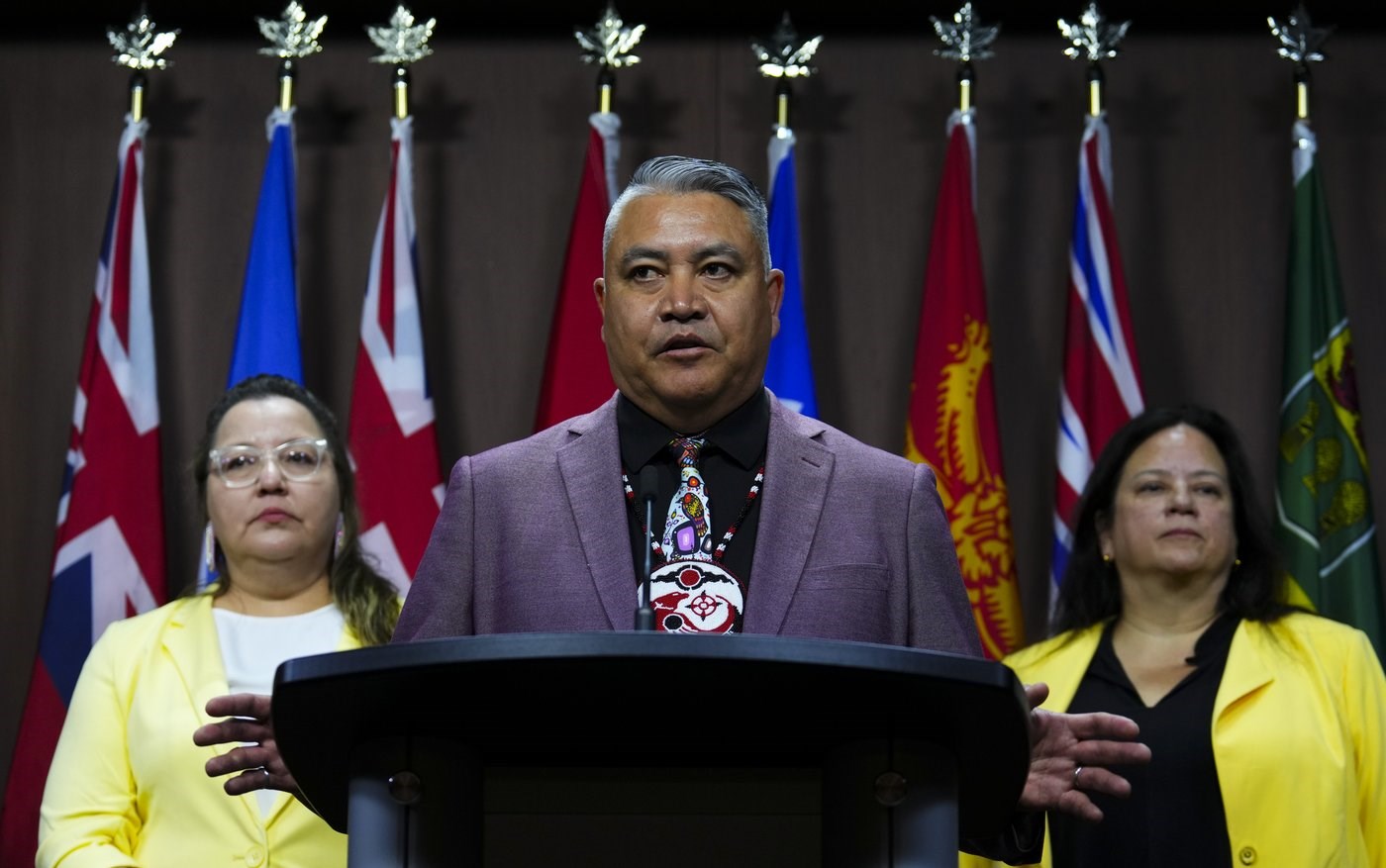
Regional Chief Terry Teegee speaks as he is joined by AFN National Chief Cindy Woodhouse Nepinak, back left, and Chair of the B.C. First Nations Justice Council Kory Wilson (Hemas Kla-Lee-Lee-Kla) on Parliament Hill in Ottawa on Wednesday, June 11, 2025. THE CANADIAN PRESS/Sean Kilpatrick
Republished June 11, 2025 - 1:43 PM
Original Publication Date June 11, 2025 - 9:16 AM
OTTAWA — The regional chief for British Columbia said Wednesday that governments should not speed up major projects at the expense of First Nations rights — and warned that projects will be slowed down by court challenges if First Nations are not consulted from the start.
"We're asking the government to follow your own laws," Terry Teegee said, citing the United Nations Declaration on the Rights of Indigenous Peoples that the federal government adopted.
The government of Prime Minister Mark Carney introduced major economic legislation last week. The bill has two parts — one to break down federal barriers to internal trade and the other to fast-track major projects. It sets out five criteria to determine whether a project is in the "national interest."
Those criteria include the project’s likelihood of success, whether it would strengthen the country’s resiliency and advance the interests of Indigenous Peoples, and whether it would contribute to economic growth in an environmentally responsible way.
But First Nations leaders say their interests weren't considered when the legislation was being drafted and they were given just one week to review and bring comments forward on a briefing document on the bill.
"It's probably going to take a lot longer to get approval for some of these projects because we're going to end up in court," Teegee said. "This is where we end up."
The national chief of the Assembly of First Nations agreed.
“It’s not about the bill itself. It’s about the process. And I think that ramming something through when you should be hearing from Canadians, from industry, from First Nations … is the wrong way to go,” Cindy Woodhouse Nepinak said.
"You don't want to end back up in court. You don't want to have civil unrest. Why not just invite us to the table?"
First Nations leaders have warned that widespread protests and blockades are possible if governments don't obtain affected Indigenous communities' free, prior and informed consent, as required by the UN declaration.
The federal government has said that declaration doesn't amount to a veto — a statement Justice Minister Sean Fraser walked back last week following criticism from Woodhouse Nepinak.
Teegee said "no government has a veto, meaning that when we come to a decision, all governments come into the room to make a decision together."
"First Nations, certainly as a part of this, need to be part of the decision-making process," he added.
Even groups that generally support development are raising concerns about the federal government's plan.
Mark Podlasly, CEO of the First Nations Major Projects Coalition, said he was "surprised" First Nations were only given seven days to review parts of the legislation before it was introduced.
"The answer will not automatically be 'no' from First Nations when a project comes along. It's just that Indigenous rights and involvement has to not only be included, but respected. That hasn't happened a lot in the Canadian past," he said.
"There's also a question on the environment, and there's a question about who bears the impact of these projects if they're rushed through. It's going to be Indigenous Peoples, especially in parts of the country where there's mining or energy sources (on lands) that are integral to our lifestyle, our cultural practices."
Podlasly said that while the federal legislation "seems to have Indigenous participation at its core," it's not clear what that participation will look like, especially under the tight two-year approval timeline the government seeks.
He said First Nations can support projects and many do — but they don't want to be "caught at the back end" of decisions made without their knowledge or consent.
"We're all operating with seven days' notice. That's what we're operating with. And time will tell," he said.
The Assembly of First Nations is holding an emergency chiefs meeting on Monday to discuss what to do next.
Woodhouse Nepinak vowed to follow their direction and said a legal review of the legislation is ongoing.
"We need time," Woodhouse Nepinak said. "And we're not being given that time."
This report by The Canadian Press was first published June 11, 2025.
News from © The Canadian Press, 2025